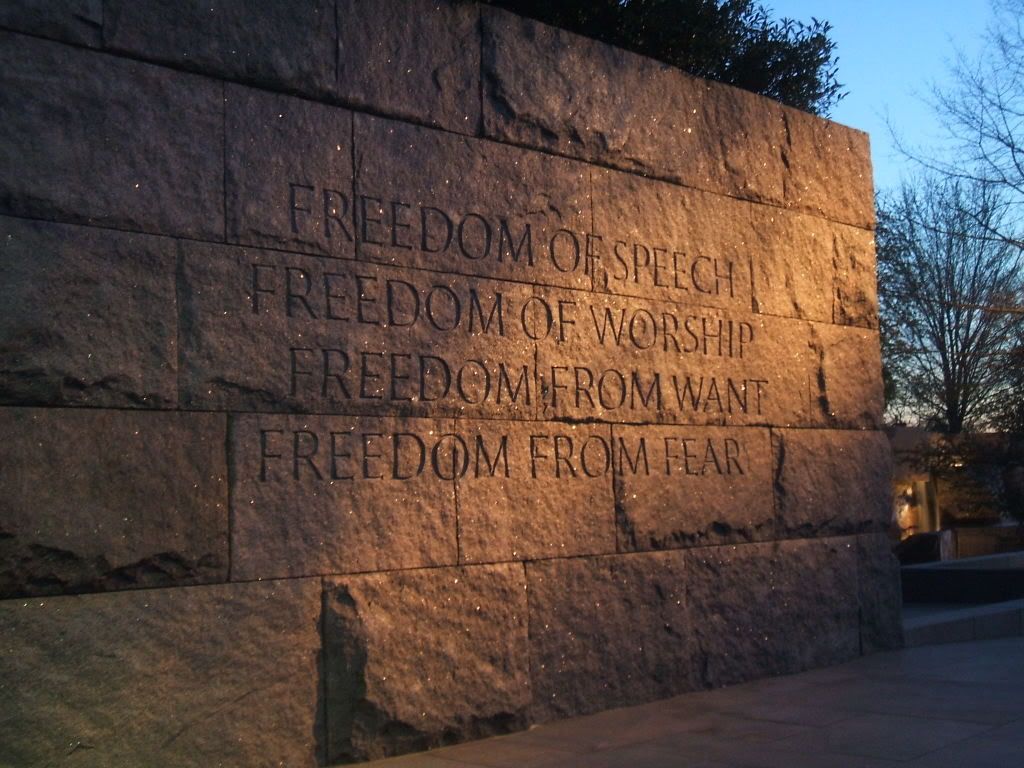31 March 2007
In which I temporarily become a 60 year old man
Anyway, my point...
By the time I got to the Korean War Memorial, I had encountered the hordes of middle school spring break trip groups. Near the pool near the top of the memorial, I saw a park ranger sit down and look sullen. He was probably about 60 or so, and just looked down. Indeed, one lady even asked if he was OK. I sat on the same bench for awhile, staring in a different direction, losing myself in thought. The kids were atrocious. One group was being led by a teacher with a toy light saber. "The statues are creepy!" The photos etched on the wall "look like ghosts."
Of course they look like ghosts. The people in those pictures (though slightly altered) represent the service members who died in that war. The statues of soldiers marching up the hill look scared because war is scary. It's not all pressed uniforms and shiny medals and big planes. It's people slogging through mud and dust killing and getting killed. It's the worst of humanity. Too often these days, wars are fought by children, and the dead are civilians, not soldiers. Just when we thought we'd hit our lowest point, we keep going lower.
And these kids don't get it. I fear they never will. Hell, my own generation doesn't get it, and some of us are being sent to fight and die for a ludicrous cause as we speak. But it doesn't touch us, really. Sure, the price of gas has gone up, but most of my friends don't have cars, so that doesn't really have much effect either. In a way, it's good that young people in America don't know what war is like. Not the huge, commit the country to the fight kind of wars of years past. But these privileged, sheltered kids don't get it. They're running around, trampling over things, screaming, yelling obscenities, and are completely untouched by trouble. For the most part, the kids tonight were white, looked relatively affluent, and probably suburban. It's not so much bothersome that they've never been touched by war, it's that they don't seem to know hardship at all.
I saw a book at the bookstore the other day entitled The "Me" Generation. I don't want to be a part of that. My grandparents grew up in the Depression in rural Tennessee. They had nothing. Literally nothing. Food was grown in the backyard, and what you couldn't grow or raise yourself, you couldn't have. While my childhood was leaps and bounds beyond that, there was still struggle involved. As a teenager, I worked after school and on weekends, and my single mother worked two jobs. We still had trouble making ends meet. If not for a scholarship, I wouldn't have gone to college. And yet in spite of that, the notion was still pounded into my head, primarily by my grandparents, that I needed to serve. There's a world out there bigger than me or anybody else, and I need to do my part, even if it's something small.
When Tom Brokaw released his book, The Greatest Generation, I was pretty incensed. I was young, idealistic, etc, (OK, I'm still those things), and thought perhaps it was premature to proclaim the greatest generation. But maybe it wasn't. Maybe it's time for the "Me" generation. Maybe there was a time when the country came together to do something big and with broad perspective, and maybe that just won't happen again. But I hope not.
respectfully submitted by
jterry
at
02:57
![]() 2
bad reactions
2
bad reactions
Labels: Ramblings, Tennessee, War and its Discontents
28 March 2007
Smithsonian Board takes governance lessons from AU
They say the problems are so big that they can't possibly be resolved until well after the media feeding frenzy is over. They may eventually call for some token transparency to appease the still-incensed, but only after at least six months have passed. After that, it's back to closed-off smoke-filled rooms to find a new leader who will again be allowed to run amok. Nothing will be done to address institutional culture or repair the broken processes that allowed for such gross misspending to occur.
Corruption doesn't exist in a vacuum, especially not at the top. If a leader is tossed out for ridiculously abusing his expense account, you can probably bet that somebody somewhere down the chain is following the dear leader's example, and will probably be the first to speak up and say the problem was only at the top. Maybe, maybe the Regents of the Smithsonian will really learn from AU and see that token change isn't good enough. If not, I hope that they at least raise the ire of Chuck Grassley and company, who, at least in AU's case, weren't too shy to say that proposed reforms weren't good enough.
And now, cue the wild speculation about who the next Smithsonian Secretary will be. For the record though, former Mayor Anthony Williams has yet to be named AU's president, so careful with the speculation.
respectfully submitted by
jterry
at
17:41
![]() 0
bad reactions
0
bad reactions
Labels: American University, Corruption, Federal Government, Mindless Incompetence
Peace deal for Cote d'Ivoire?
While it is satisfying that Ivoiran president Laurent Gbabgo has seemingly fulfilled his promise to unilaterally seek a peace deal, without United Nations or African Union mediation, I'm still not sure of what all has gone on behind the scenes. You see, the negotiator for this current deal was the president of Burkina Faso, Blaise Compaore. What does that matter? Compaore has been implicated in financing (or at least conducting transactions for) and equipping rebel movements under Foday Sankoh and Charles Taylor in Sierra Leone and Liberia, respectively. Thus I just don't really trust his peacemaking overtures.
Furthermore, Cote d'Ivoire is two years overdue for presidential elections, which have served to continue Gbabgo's rule. While the UN Security Council basically installed a powerful prime minister last year, Gbabgo has remained and loves to give reasons for why elections can't occur (ok, so yeah, the country is divided into two parts, but surely something could have been worked out). Both FN and government leaders have also violated a series of peace agreements within the past three years.
So now they're setting up shop together to prepare for these long awaited elections? I think something shady is going on here, but I can't quite put my finger on it quite yet. I guess time will tell.
respectfully submitted by
jterry
at
17:14
![]() 0
bad reactions
0
bad reactions
Labels: Africa News, Burkina Faso, Cote d'Ivoire, Peace Agreements, Peacebuilding, War and its Discontents
21 March 2007
Goodbye winter
We hardly knew ye, and Buster was unamused by your precipitation.

 Say hello to spring by spending those ugly new dollar coins. They're better for the environment, less wasteful, and less nasty than the paper variety. Make Al Gore happy, and spend a dollar coin today.
Say hello to spring by spending those ugly new dollar coins. They're better for the environment, less wasteful, and less nasty than the paper variety. Make Al Gore happy, and spend a dollar coin today.
respectfully submitted by
jterry
at
16:42
![]() 0
bad reactions
0
bad reactions
20 March 2007
Refugees and repatriation
In their chapter in the book Problems of Protection, Erik Roxstrom and Mark Gibney discuss the circumstances surrounding UNHCR's involvement in handling individuals who fled the Bosnian war in the mid-90s. UNHCR encouraged very reluctant Western European states to accept Bosnian refugees on the grounds of so-called "temporary protection," which was a classification assigned en masse to all fleeing Bosnians. This was apparently to ease concerns the would-be host states had over taking in and then keeping a large refugee population indefinitely. Yet it led to a period wherein Bosnians found themselves unable to integrate into new societies and thus unable to do much to fend for themselves. It was obviously unsafe for them back home, what with ethnic cleansing going on and all, but these individuals were seen with contempt by the countries to which they fled. That, to me, is most distressing.
This summer while I was at the Liberian refugee camp in Ghana, I noticed huge UNHCR posters all over that proclaimed "Go home! Liberia is safe!" These struck me on a number of levels. For one, the pictures of children sitting in well-kept schools were obviously false. An accompanying DVD I later got to watch that had been developed particularly for inhabitants at this camp also showed several things that clearly were one-hit wonders, so to speak, including pictures of schools at that very camp which didn't actually exist. Many people at the camp were of the belief that if UNHCR was willing to lie to them about conditions right under their noses, they certainly couldn't be trusted to tell what was really going on back in Liberia. These refugees argued, quite effectively, that they had no business going home when every communication with family and friends revealed one of two things: 1) residual violence was still common, and thus repatriation was unsafe, or 2) the local economy in their home village was so destroyed that there was almost literally nothing to return to.
My problem, then, is with the repatriation issue is handled. Refugees should be able to enjoy the full protections offered under the Refugee Convention and other relevant international instruments. They should also be able to seek and receive permanent asylum if there is a genuine fear of persecution. Temporary protection then doesn't quite reach the same standard. It allows for host states to relegate refugees to poor conditions and second-class (or worse) status by refusing to let them work. I'm not saying that all refugees should be automatically integrated into the country to which they've fled, but that they should be protected under the law, and at least be allowed to find some means of subsistence, especially when international aid is not forthcoming. Indeed, most people who flee their homes as refugees don't want to be integrated into someplace new. They want to go home, but they want to go home when it safe to do so. In the meantime, they want to ensure that their children are fed and sheltered, which is often why they left in the first place.
Repatriation in most instances is still a voluntary choice. But with asylum regulations tightening around the globe, safety outside one's home country is becoming harder to find. Also, UNHCR has been instructed to do more to prevent refugee crises from beginning. This doesn't mean that people are no longer being displaced by conflict, just that they're now mostly staying within their own borders. These people, known as internally displaced persons (IDPs), are especially vulnerable, and there are virtually no international legal protections for them, and no institutionalized mechanisms to deal with them. Thus in pressing situations like Darfur, you find large camps of displaced people that are essentially sitting ducks, waiting to be targeted once again by the very people they fled.
I think the push for repatriation (especially when based on false information) is problematic mostly because it fails to take into account why people left in the first place. While it is obvious that refugees shouldn't have to face refoulement (return to place of origin where there is valid evidence that they will face persecution), not having to face persecution and enjoying security or economic viability are very different things. I think Liberian President Ellen Johnson Sirleaf put it well when she said that of course the Liberian government wants all its people to return home, but only when there is sufficient infrastructure to support a large group of people who will obviously need assistance in rebuilding their lives. Should they come home before this point, they just further drain already stretched networks of support.
Yet if we're only going to insist upon repatriation when it refugees can viably subsist at home, then many nations need to seriously reexamine their asylum and relevant immigration laws. Asylum is increasingly difficult to claim as Western nations clamp down on immigration as part of their anti-terror efforts. Fact is, if UNHCR has to beg a wealthy country like Germany to take in some refugees from nearby, then a dirt poor country like Chad has little incentive to take in refugees of its own free will. If people are are fleeing persecution, mass violence, or some other sort of disaster, the decent human being in all of us should kick in and we should protect these individuals and provide for their basic needs. Only after that is done should we even think to start asking about when they'll go home.
respectfully submitted by
jterry
at
04:10
![]() 0
bad reactions
0
bad reactions
Labels: Liberia, Peacebuilding, Refugees, Sudan, United Nations, War and its Discontents
14 March 2007
Help for the UN, version 1.0
 What would you like to do?
What would you like to do?1) Plead with the world's only remaining superpower to stop ignoring it whenever said superpower can't get its way.
2) Send yet another terse letter to that pesky African dictator who keeps thwarting its plans, reminding him that the decisions of the peace and security apparatus are legally binding.
3) Create another committee, to create subcommittees, to think about how one might make the peace and security apparatus less resemblant of the Stone Age.
4) Outsource to regional conglomerates, regardless of capabilities.
5) Have Lakhdar Brahimi make it work -- they don't call him Mr. Fix-it for nothing.
6) Replace all apparatus members with high school students and hope that they can do better.
Photo from here.
respectfully submitted by
jterry
at
15:49
![]() 0
bad reactions
0
bad reactions
Labels: Iraq, Mindless Incompetence, Peace Operations, Security Policy, Serious Diplomacy, Sudan, United Nations
12 March 2007
OMG, diplomats have sex
I know this has already been written about elsewhere.
But...
BWAHAHAHAHAHAHA!
It was crazy kinky sex too.
They had to take the ball gag from his mouth to get his name!
Now, if only the Googles would give me a photo of this man so my laughter could continue.
respectfully submitted by
jterry
at
20:34
![]() 0
bad reactions
0
bad reactions
Labels: Funny Quotes, Mindless Incompetence, Serious Diplomacy
11 March 2007
We're all gonna die
Initially, I suspected that the case was brought against the District by people living in the wealthiest, safest, least crime riddled (and also whitest) parts of the city, who were afraid of riff raff coming into their homes and killing off their babies and/or stealing grandma's china. After a little muckraking though, this theory seems not to be true. As far as I can tell, none of the appellants live in Ward 3, which fits the above description best.
But I guess all that is mostly irrelevant. What it boils down to is that these people want to be able to "defend themselves" against whatever it is that makes them afraid. That's fine with me, in principle. However, I take issue when one individual's "self defense" makes others feel less safe, or unsafe. I should note here that I grew up in a gun owning home. Hell, my father had an arsenal. And in all those years, knowing that we had roughly 3 guns per capita in my home only scared me even more.
Hypothetical situation: I live in a big apartment building (ok, so that part's true). The walls are thin. I own a gun. I'm at home one night, and it sounds like somebody's breaking in. I draw my gun. Say there's an actual intruder. We spar. Guns go off accidentally. One bullet kills my bunny, one injures my partner, and one goes through the thin wall separating my unit and the one next door, fatally wounding my neighbor's baby.
I promise you, grandma's china ain't worth that much.
Yes, there may be some remote chance that someone may break into your detached house with a crowbar on a hunt for your TV. Your drawing a gun on them may well scare them away. Or it may cause them to scuffle with you to try to get the gun. Then they've got the gun, and your TV, and you've still put your family at greater risk.
Remember the NRA's old line: "Guns don't kill people. People kill people." That's exactly true. Whomever is holding a gun, legally or not, is automatically at risk of killing or injuring someone. Home arsenal or not, it was blasted into my young head that one should never aim a gun at someone else. Guns were specifically invented as instruments of death, whether for combat or hunting. Thus when you pull your gun on crowbar man, you're threatening him with death, and then who knows what he'll do. Conversely, that same fear is why criminals wield guns in the first place: to scare you into giving up your TV, wallet, or whatever they're after. Yes, people commit outright murders with guns, but unless you're really a complete asshole or already engaging in some sort of criminal activity, you probably don't have to worry about that either.
I've seen at least a couple comments on DCist with people talking about making muggers think twice because now their victims may also be packing heat. Yet that's also ridiculous, and outside the scope of Friday's ruling, which applied exclusively to owning guns within homes, and upheld restrictions on carrying weapons through public space. Thus if mugger and victim are both carrying guns, then they're both breaking the law, and, frankly, both likely to end up dead. Again, the victim's attempt at defense makes the situation more dangerous not just the two individuals involved, but also for anyone who happens to be in the vicinity, including that cute little toddler staring out the window with his dog.
Basically, what I'm saying is that while living in the District, you don't need a damn gun. You're only endangering more lives (especially if you're an amateur shooter rather than a well trained marksman who practices regularly) than are already at risk with the guns already on the streets. But, if you wanna kill your wife to keep your TV, I guess that's your business too.
respectfully submitted by
jterry
at
19:57
![]() 0
bad reactions
0
bad reactions
Labels: DC Life, Mindless Incompetence, Mrs. Kravitz Tendencies
06 March 2007
Dear DC dog owners...
The final offense was just sick. I was walking home just now with a bag of productivity enhancing treats from the Columbia Road Safeway. As I was walking, I was thinking about eating tasty cookies and getting some work done. Then I smelled something foul.
Lo and behold, there was some dumb lady with her dog, as it took a shit.
On.
The.
Damn.
Sidewalk.
No, not in the little planter box thing right beside the sidewalk, but on the sidewalk itself, as people like me were walking by.
I was offended. I was outraged. Scowling was involved. The dignified little old lady behind me let out a loud "mmph!" and crossed the street. My outrage was slightly mitigated by the fact that the moron at least had a bag at the ready to scoop her poop, but as the impending joy of cookie eating was replaced by the sight and smell of a dog defecating, outrage was the dominant feeling.
So that tears it. Dog owners beware. I am both passive aggressive and have a bad attitude. Who knows what hell I may choose to rain down on you should I bear witness to your irresponsible pooping habits. And if you don't want to clean up after your pet, then you need to get rid of it. I dutifully clean my bunny's litter box and sweep up his stray little poop balls. You do the same with your animal. And if the notion scooping up poop in a plastic grocery bag and indignantly carrying it around offends you as much as it offends me, then perhaps the dog was the wrong choice, you fucking dumbass.
respectfully submitted by
jterry
at
21:38
![]() 1 bad reactions
1 bad reactions
The State Department wants YOU for cannon fodder
I think I'm actually decently qualified now to do the kind of work they're seeking, especially rule of law stuff, but I don't know Arabic or Kurdish, and also want to see my 25th birthday.
Anyway, the ad is below, in case your church/synagogue/temple/mosque is capable of holding a big enough bake sale to purchase the body armor that will at least keep you from being shot up, though it is remarkably less effective against being blown up. Good luck.
--
PROVINCIAL RECONSTRUCTION TEAMS (PRT)
Are you interested in a unique opportunity to serve abroad? Join the US Department of State.
The Department of State is seeking to hire skilled US Citizens to fill positions in Iraq. Several positions are with Provincial Reconstruction Teams located throughout Iraq.
The PRT mission is to assist Iraq's provincial governments: to develop a transparent and sustained capability to govern, to promote increased security and rule of law, to encourage political and economic development, and to provide services that will meet the basic needs of the Iraqi people.
We are currently looking for applicants with skills, experience and expertise in the following fields: Governance, Economics, Rule of Law, Agri-Business, Veterinary Medicine, City Management/Engineering, Business Specialist, Medical, Public Diplomacy and Industry Specialists. If you are interested, please send your resume to IRAQPRTS@STATE.GOV. Note your area of expertise in the subject line of the e-mail.
respectfully submitted by
jterry
at
01:22
![]() 0
bad reactions
0
bad reactions
Labels: Foreign Policy, Iraq, Peacebuilding, War and its Discontents










